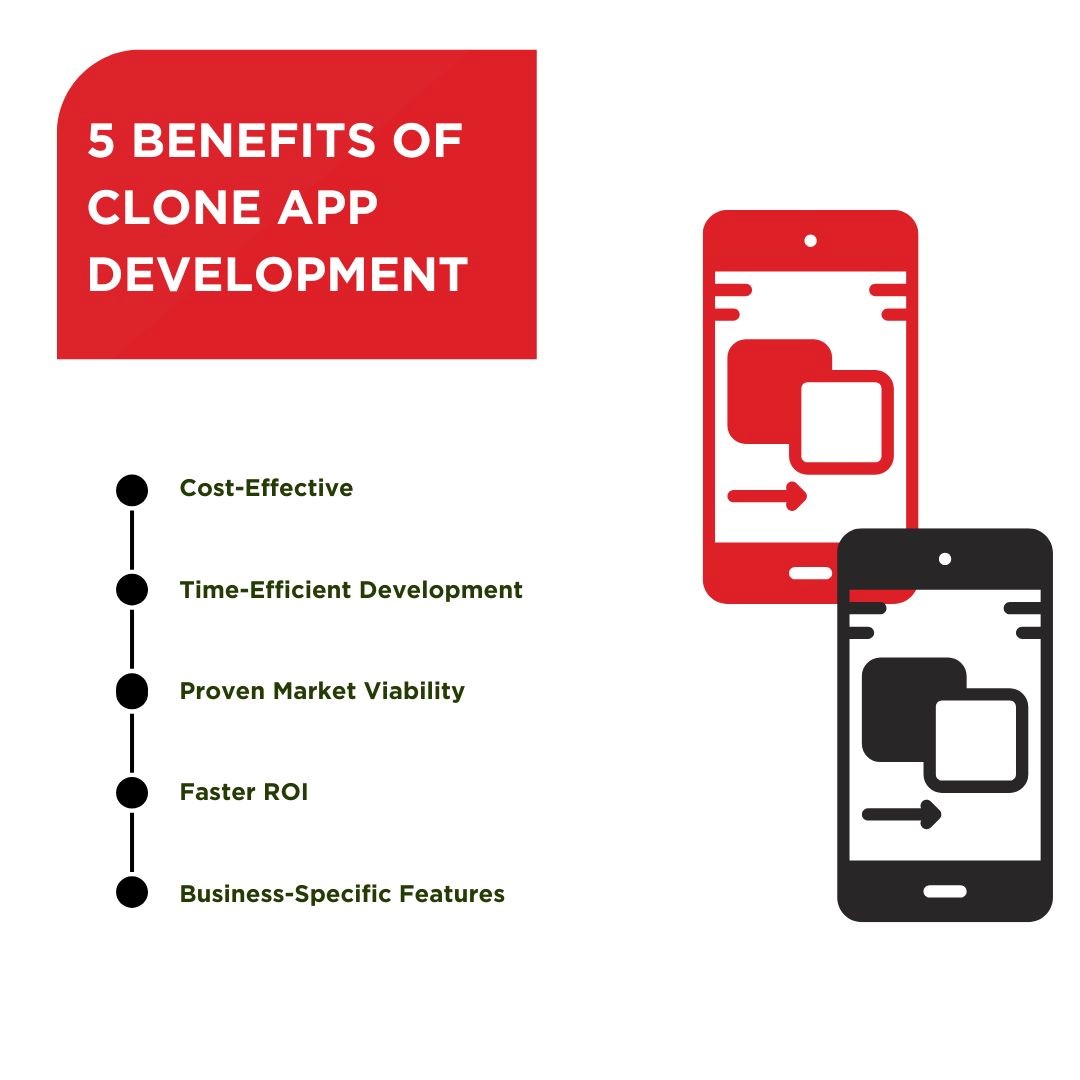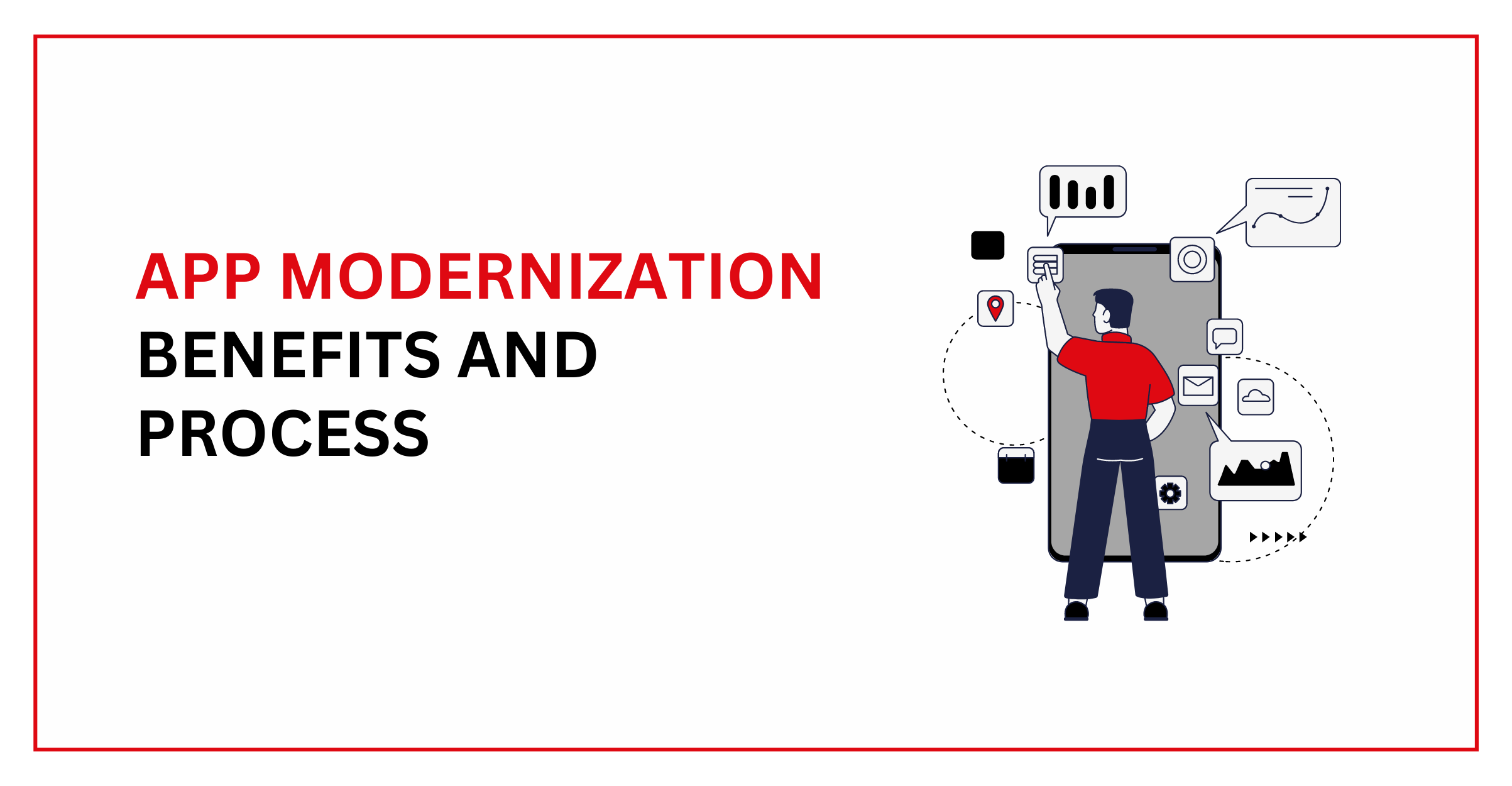Do you have a brilliant app idea, but the development costs seem overwhelming? Clone app development might be the answer! This approach leverages existing successful apps as a foundation, allowing you to launch a similar app with a focus on a unique niche or enhanced features. However, it is crucial to understand the legalities, development process, and potential challenges involved.
This comprehensive guide will equip you with everything you need to know about clone app development. We’ll delve into the concept, explore profitable app ideas, and guide you through the development process from concept to launch. Let us start with some clone app development stats for better understanding.
What is Clone App Development
Clone app development involves creating an app that replicates a successful existing app but with some modifications. This helps developers and businesses utilize proven app models, simplify development processes, take advantage of current market trends, and add their unique value propositions.
Why Clone App Development is Popular?
The surge in clone app development has gained traction due to some compelling factors in the mobile app landscape below:
Market Demand
There is an increasing appetite for apps that mirror the functionalities of popular ones but come with unique twists or enhancements. Clone app development enables developers to seize this demand by tailoring apps to specific niches or catering to particular user preferences. Users often seek familiarity with an added touch of innovation, making clone apps a lucrative avenue for developers to capitalize on market trends and user expectations.
Cost and Time Efficiency
Developing a clone app proves to be a cost-effective and time-efficient approach compared to starting from scratch. Replicating existing features and functionalities minimizes the need for extensive research, design, and development efforts, thereby reducing development costs and accelerating time to market. With a solid foundation provided by successful app models, developers can focus resources on customization and optimization, ensuring a swift and economical development process.
Reduced Risk
Clone apps are built upon proven models that have already established themselves in the market. Leveraging these successful models mitigates the risk associated with launching entirely new concepts, as developers can tap into existing user bases and capitalize on established market demand. By replicating features and experiences that have resonated with users, developers can minimize the uncertainty inherent in introducing novel app ideas, thereby enhancing the likelihood of success.
Access to Proven Business Models
Successful apps often establish proven business models and monetization strategies. Clone app development allows businesses to replicate these models, minimizing the uncertainty associated with launching entirely new concepts. By emulating the features and functionalities of popular apps, developers can tap into existing user behaviors and preferences, increasing the likelihood of success in the market.
Competitive Advantage
Offering a clone app with value-added features or enhancements provides developers with a competitive edge in the crowded app market. By differentiating themselves from competitors and capitalizing on the popularity of existing apps, developers can attract users who are already familiar with similar offerings. This strategic approach enables developers to carve out their niche, attract a loyal user base, and establish themselves as key players in the competitive app landscape.
Market Validation
Clone app development serves as a valuable tool for testing the viability of app ideas in the market without committing substantial resources upfront. By releasing a clone app and analyzing user feedback, engagement metrics, and market response, developers can gain valuable insights into user preferences, behaviors, and market dynamics. These insights enable developers to refine their product strategy, iterate on features, and make informed decisions about future development efforts, ultimately increasing the likelihood of success in the competitive app market.
Benefits of Clone App Development
Creating a clone app is an effective way for businesses to compete in the highly competitive app market. Let us explore some of the benefits of clone app development below:

1. Cost-Effective Solution
Clone app development offers a more budget-friendly alternative than building an app from scratch. For example, if you’re interested in creating an app like Snapchat, you can leverage existing resources and technical infrastructure to reduce development costs.
2. Time-Efficient Development
Clone apps enable faster time-to-market compared to building apps from scratch. By leveraging proven apps like Instagram, you can streamline the development process and bring your app to market more quickly.
3. Proven Market Viability
Clone apps are built upon successful app models that have already demonstrated market viability. For instance, popular apps like TikTok have paved the way for similar solutions to thrive in the market. By replicating proven winners, you can tap into existing user demand and increase the likelihood of your app’s success.
4. Faster ROI
One key advantage of clone apps is the ability to achieve a quick return on investment. Since clone apps are based on proven ideas, they can gain traction rapidly and generate revenue sooner. For example, apps like Airbnb have revolutionized their respective industries, offering lucrative opportunities for businesses to capitalize on similar concepts.
5. Business-Specific Augmented Features
While clone apps provide a solid foundation, they also offer the flexibility to add custom features that align with your business objectives. Whether you’re building a ride-sharing app like Uber, you can tailor the clone app to your industry or niche.
Clone App Development Process
Developing a clone app involves several key steps to ensure a successful outcome. Here’s a detailed guide to help you navigate the clone app development process:
1. Market Research
Begin by conducting thorough market research to identify popular apps in your target niche. Analyze user preferences, behaviors, and pain points to understand the demand for similar apps. Explore competitor apps to identify their strengths, weaknesses, and unique selling points.
2. Conceptualization
Define the objectives and goals of your clone app project. Determine the specific features and functionalities you want to replicate or enhance from existing apps. Create a detailed plan that outlines the scope, timeline, and resources required for development.
3. Design
Develop wireframes or mockups to visualize the layout and user interface of your clone app. Design the user interface (UI) and user experience (UX) elements to ensure a seamless and intuitive user journey. Incorporate branding elements and visual aesthetics to align with your brand identity.
4. Development
Choose the appropriate technology stack and development frameworks based on your project requirements. Write clean, modular code to implement the app’s features and functionalities. Integrate APIs, databases, and third-party services to enhance the app’s functionality and connectivity.
5. Testing
Conduct rigorous testing to ensure the app functions as intended across different devices and platforms. Test for usability, performance, security, and compatibility to identify and address any bugs or issues. Gather feedback from beta testers or focus groups to validate the app’s user experience and make necessary improvements.
6. Deployment
Prepare the app for deployment to app stores or distribution platforms. Create marketing materials, app descriptions, and promotional assets to attract users. Submit the app to app stores and follow their guidelines and requirements for approval.
Popular Clone App Ideas
1. Uber Clone App
The Uber clone app replicates the innovative ride-hailing service pioneered by Uber. It allows users to book rides conveniently through their smartphones, track drivers in real time, and make cashless payments. For entrepreneurs looking to enter the lucrative transportation industry, developing an Uber clone app offers the opportunity to capitalize on the growing demand for on-demand ride services.
2. Spotify Clone App
The Spotify clone app mirrors the popular music streaming platform, offering users access to a vast library of songs, podcasts, and audio content. With personalized playlists, curated recommendations, and seamless offline listening features, a Spotify clone app provides music enthusiasts with a convenient and immersive listening experience. Entrepreneurs can tap into the booming music streaming market by creating their own version of the Spotify app.
3. Etsy Clone App
The Etsy clone app recreates the online marketplace for handmade, vintage, and unique goods pioneered by Etsy. It enables artisans, crafters, and small businesses to showcase their products to a global audience and connect with buyers seeking one-of-a-kind items. By developing an Etsy clone app, entrepreneurs can empower creators and artisans to monetize their craft while providing shoppers with a curated selection of unique products.
4. Netflix Clone App
The Netflix clone app emulates the popular subscription-based streaming service, offering users a vast library of movies, TV shows, and original content. With features like personalized recommendations, multi-device streaming, and offline downloads, a Netflix clone app delivers a premium entertainment experience to subscribers. Entrepreneurs can capitalize on the growing demand for on-demand video content by creating their own version of the Netflix app.
5. Instagram Clone App
The Instagram clone app replicates the iconic photo and video-sharing platform, allowing users to capture, edit, and share moments with friends and followers. With features like filters, stories, reels, and IGTV, an Instagram clone app provides users with a visually appealing and engaging social media experience. Entrepreneurs can tap into the popularity of visual content and social networking by developing their version of the Instagram app.
6. TikTok Clone App
The TikTok clone app mirrors the viral short-form video-sharing platform, enabling users to create and discover entertaining content in various categories. With features like lip-syncing, duets, and challenges, a TikTok clone app offers users a platform to showcase their creativity and engage with a global audience. Entrepreneurs can capitalize on the popularity of short-form video content by developing their version of the TikTok app.
7. Zomato Clone App
The Zomato clone app recreates the popular food delivery and restaurant discovery platform pioneered by Zomato. It allows users to explore nearby restaurants, view menus, place orders, and track deliveries in real time. With features like user reviews, ratings, and recommendations, a Zomato clone app provides food enthusiasts with a convenient way to discover and order from their favorite eateries. Entrepreneurs can enter the booming food delivery market by developing their version of the Zomato app.
8. Fiverr Clone App
The Fiverr clone app replicates the freelance marketplace platform, enabling users to buy and sell digital services in various categories. From graphic design and copywriting to programming and digital marketing, a Fiverr clone app connects freelancers with clients seeking affordable and high-quality services. Entrepreneurs can tap into the gig economy by developing their version of the Fiverr app.
9. TaskRabbit Clone App
The TaskRabbit clone app mirrors the popular platform for outsourcing errands and tasks to skilled individuals in the local community. From house cleaning and furniture assembly to handyperson services and event planning, a TaskRabbit clone app connects users with reliable Taskers to get things done efficiently. Entrepreneurs can capitalize on the growing demand for on-demand services by creating their own version of the TaskRabbit app.
Challenges and Limitations of Clone App Development
While clone app development offers several benefits, it also comes with its fair share of drawbacks and challenges. Here, we’ll explore some of the key considerations to keep in mind:
Legal and Ethical Concerns
One of the primary challenges of clone app development is navigating the legal and ethical implications. Copying the features and functionalities of existing apps too closely can infringe on intellectual property rights and lead to legal disputes. Developers must ensure they have the proper licenses and permissions to replicate certain aspects of an app, and they should strive to add unique value to differentiate their clone app from the original. Learn more about protecting your app idea legally by visiting our blog on how to patent an app idea.
Lack of Innovation
While clone apps provide a shortcut to market and can be cost-effective, they may need more innovation compared to original app concepts. Relying too heavily on existing app models can stifle creativity and limit opportunities for differentiation. To stand out in a crowded market, developers must find ways to innovate and add unique features or improvements that provide value to users.
Limited Customization
Clone app development often involves working within the constraints of existing code and technical infrastructure. While this saves time and resources, it also limits the extent of customization and scalability. Developers may find themselves needing help to implement certain features or adapt the app to changing user needs and market trends, leading to a less flexible and adaptable product.
Reputation Risks
Building a clone app that closely resembles an existing popular app can carry reputation risks. Users may perceive the clone app as a knock-off or copycat, which could damage the developer’s brand reputation and credibility. To mitigate this risk, developers must ensure their clone app offers genuine value and addresses specific user needs in a distinct and meaningful way.
Dependency on Original App’s Success
Clone apps are inherently reliant on the success of the original app they are replicating. If the original app loses popularity or faces significant challenges, the clone app may suffer as well. Developers must carefully consider the long-term sustainability and viability of the app model they are cloning and be prepared to pivot or adapt if necessary.
How much does it cost to build a clone app?
Determining the cost of building a clone app depends on various factors, including the level of complexity involved. Developing a clone app can cost between $10,000 and $200,000, depending on its complexity, features, and the development company rates. Here’s a breakdown of estimated costs and timelines:
1. Simple Clone App
The development cost for a simple clone app typically ranges from $10,000 to $25,000. The timeline for developing such an app usually falls within the range of 1 to 3 months.
2. Moderate Complexity Clone App
A clone app with moderate complexity may require an investment of $25,000 to $55,000. The development timeline for this level of complexity typically extends from 3 to 6 months.
3. Complex Clone App
Developing a complex clone app involves a higher investment, ranging from $55,000 to $200,000 or more. The development timeline for such apps can span from 6 months to 1 year or longer.
These estimates are approximate and can vary based on several factors, including development approach, platform compatibility, design intricacy, incorporation of additional features, geographical location of the development team, ongoing maintenance requirements, legal considerations, and marketing expenses.
The complexity of your specific clone app and the desired features will significantly influence the final cost. Consulting with Clone App Development Companies in USA is recommended to obtain a more accurate estimate tailored to your project’s unique requirements.
Build Your Clone App with the Top Clone App Development Company
Clone apps have become a popular and efficient way to launch platforms with proven business models. Whether you’re looking to enter the market with an app similar to Uber, Airbnb, or any other successful platform, partnering with the top clone app development company like TechnBrains, ensures that your vision is executed with precision, innovation, and quality.
Why Choose TechnBrains for Your Clone App Development?
- Proven Expertise: with a decade of expertise in clone app development, we offer customized solutions that encapsulate all the essential features of your desired app, while also incorporating unique elements to set your platform apart.
- Rapid Market Entry: Our streamlined clone app development process and agile methodology allow for rapid prototyping and development, ensuring that your app enters the market swiftly, giving you a competitive edge.
- Cost-Effective Solutions: Developing a clone app with TechnBrains is cost-effective, as our dedicated developers leverage the successful apps, reducing the time and resources required for development from scratch.
- High-Quality Standards: We ensure that your clone app is robust, scalable, and performs seamlessly across all devices and platforms, providing an excellent user experience.
- Customization and Scalability: While the foundation of your app might be inspired by an existing app, we offer extensive customization options to tailor the app to your business model, target audience, and brand identity. Our apps are designed for scalability, supporting your business growth.
- End-to-End Services: From ideation, design, and development to testing, launch, and post-launch support, TechnBrains provides comprehensive services to make your clone app development journey smooth and successful.
Inspired by an existing idea? Lets Customize it Together
TechnBrains offers custom clone app development services that match the functionality of the original app while catering to your unique business needs. Build your app with us and turn your idea into reality with our expertise and customer-centric approach. Join the digital world with proven business models and innovative solutions.
Wrapping it Up
Clone app development is an exciting opportunity for entrepreneurs and businesses looking to enter the competitive app market with reduced risk and accelerated timelines. By leveraging existing successful app models and adding unique twists or enhancements, developers can create compelling clone apps that cater to specific niches or user preferences. However, to ensure a successful outcome, it’s imperative to navigate the legal and ethical considerations, understand the development process, and anticipate potential challenges.
With the comprehensive guide provided, you’re well-equipped with the knowledge and insights needed for your clone app development journey. Whether you’re considering replicating popular apps like Uber or Spotify or exploring niche markets with unique clone app ideas, the potential for success awaits. So, don’t wait any longer. Start your clone app development journey today and unlock the opportunities that lie ahead!
Faqs
What is clone app development?
Clone app development creates a software application that closely imitates an existing app’s features, functionality, and user interface.
Are app clones illegal?
App cloning is allowed if it doesn’t infringe on existing business intellectual property (IP) rights such as patents, copyright, or trademarks. However, “cloning” doesn’t mean copying the whole app, rather it means taking inspiration to create something new.
Can I make a clone of an app?
With TechnBrains clone app development services you can duplicate Ios, Android apps and customize them with different names and icons. Not all apps may work perfectly after being cloned but duplicating apps can enhance productivity in some cases.
What is clone in development?
Clone app development is the process of creating an app that mimics an existing app in terms of design and functionality. Developers begin with the original app as a blueprint and then make changes to add new features or enhancements.
Can a clone app be detected?
By correlating device signals, verifying users, and analyzing their behavior, you can effectively detect fake app clones and prevent fraud.






